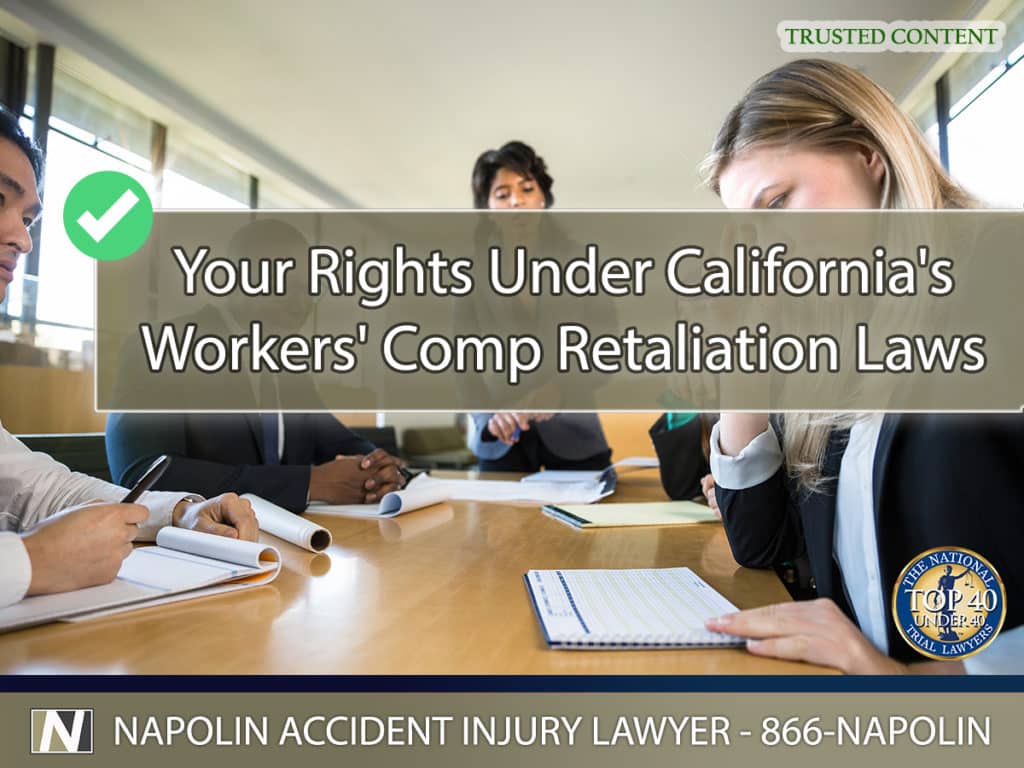In California, the law provides robust protections for employees who have been injured on the job, ensuring they receive the support and compensation they need during their recovery. Central to these protections is the right to file a workers' compensation claim without fear of retaliation from employers. Unfortunately, not all employers adhere to these legal obligations, sometimes responding to claims with actions that can further harm the injured worker. This article delves into the specifics of workers' compensation retaliation in California, outlining the legal protections in place, the forms retaliation can take, and the steps injured workers can take to defend their rights.

Understanding Workers' Compensation Retaliation
Understanding Workers' Compensation Retaliation
Workers' compensation retaliation is an illegal practice where employers punish employees for filing or intending to file a workers' compensation claim. This can include firing, demoting, reducing pay, or creating a hostile work environment for the injured employee. California's Labor Code section 132a is designed to protect workers from such retaliation, emphasizing the state's commitment to ensuring injured workers can seek compensation without fear. The law recognizes the imbalance of power in the employer-employee relationship and seeks to level the playing field, offering a legal framework through which injured workers can seek justice and compensation for retaliatory actions.
The Scope of Discrimination and Retaliation
Retaliation by employers can take many forms, some overt and others more subtle. Beyond termination, employers may engage in actions such as assigning injured workers to less desirable tasks, unjustifiably poor performance reviews, or excluding them from training and advancement opportunities. Such actions not only affect the worker's income and career trajectory but also their emotional and psychological well-being. Recognizing these forms of retaliation is the first step in fighting back. California law provides a broad definition of retaliation to encompass any adverse action that could deter a reasonable person from making or supporting a workers' compensation claim.

Legal Recourse for Victims of Workers' Compensation Retaliation
Legal Recourse for Victims of Workers' Compensation Retaliation
Victims of workers' compensation retaliation have several avenues for legal recourse under California law. Filing a 132a claim is the primary method for seeking justice, allowing workers to pursue increased compensation, job reinstatement, and recovery of lost wages. The process involves presenting evidence of retaliation to the Workers' Compensation Appeals Board, demonstrating how the employer's actions have violated section 132a. Successful claims can result in significant remedies, including monetary penalties against the employer, reinstatement of the employee to their former position, and compensation for lost wages and benefits. This legal framework underscores California's commitment to protecting injured workers and holding retaliatory employers accountable.
The Distinction Between 132a Claims and Regular Workers' Compensation Claims
It's crucial for injured workers to understand the distinction between a 132a claim and a regular workers' compensation claim. While both are integral to the workers' compensation system, they serve different purposes. A regular workers' compensation claim focuses on obtaining benefits for the injury itself, such as medical expenses and disability payments. In contrast, a 132a claim specifically addresses retaliation or discrimination by the employer for exercising workers' compensation rights. This distinction is important because it highlights the dual protections available to injured workers: one for the injury and another for safeguarding against employer misconduct.
Steps to Filing a 132a Claim
Filing a 132a claim requires careful preparation and adherence to legal procedures. The first step is to gather evidence of the retaliatory actions, including any relevant communications, witness statements, and documentation of changes in employment status or conditions. Next, the injured worker must file a petition with the Workers' Compensation Appeals Board, outlining the basis of the retaliation claim and the requested remedies. It's important to file this claim within one year of the retaliatory action to meet statutory deadlines. Seeking the assistance of an experienced workers' compensation attorney can be invaluable in navigating this process, ensuring that the claim is properly presented and that the worker's rights are fully protected.
Preventing Retaliation: Employer Obligations and Worker Rights
Employers in California are obligated to comply with workers' compensation laws, including the prohibition against retaliation. This means creating a workplace environment where injured workers feel safe to report injuries and file claims without fear of adverse consequences. For workers, understanding their rights is the first line of defense against retaliation. This includes knowing the legal protections afforded under section 132a, the signs of retaliatory behavior, and the steps to take if retaliation occurs. Armed with this knowledge, injured workers can better navigate the challenges of recovering from a workplace injury while protecting their employment rights and future.
Your Rights Under California's Workers' Compensation Retaliation Laws
Your Rights Under California's Workers' Compensation Retaliation Laws
The path to recovery for injured workers in California is protected by laws designed to ensure they receive the support and compensation they deserve. However, when employers retaliate against employees for exercising their rights, it's crucial to take action. Understanding your rights under California's workers' compensation retaliation laws is the first step. If you believe you've been the victim of retaliation, don't hesitate to seek legal assistance. Contact Napolin Accident Injury Lawyer at (909) 962-8415 for a free consultation. Our team, with extensive litigation experience in workers' compensation retaliation cases, is dedicated to helping you understand your rights and pursue the justice you deserve.

